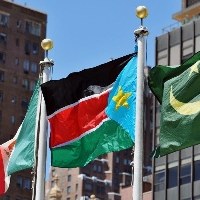![]()
Fri, Nov 04, 2011 | Rubin Reports | By Barry Rubin

This caricature recently appeared on the Egyptian political website Mashy.com; it speaks volumes. The bent over, golem-like figure represents al-thawra, or Egypt's "Revolution." Serving as a platform to the nation's "throne," this hijacked and hobbled "Revolution" is casually ascended by one of the Salafis—also known as "Islamists," "jihadists," "radicals," or, according to them, "good, pious Muslims." (text by Raymond Ibrahim; published in Jihad Watch, nov 4, 2011: http://www.jihadwatch.org/2011/11/speaking-of-islam-related-cartoons.html).
The Battle for Egypt: The Army Strikes Back
This is of tremendous importance. Only hours ago I wrote about how the Egyptian military felt forced by circumstances to play a bigger, longer political role in order to stem anarchy and prevent Egypt from becoming an Islamist state. Now there’s more evidence of that happening.
In an editorial that reflects also the Obama administration’s position, the Washington Post explained that the army having political power is bad and civilian rule is good:
The generals’ justification for their proposed decree will sound familiar to any student of the Mubarak regime: They claim to be protecting the country from Islamic fundamentalists, who appear likely to capture a plurality of seats in parliament.
I understand this point and the value of electoral democracy. But let’s review recent history.
The Carter administration refused to back the shah of Iran (a bad dictator) and helped bring us Islamist Iran (a worse dictatorship by far). In Turkey the European Union, on similar principles, helped destroy the military’s influence and ushered in an era when an Islamist regime acts increasingly like a dictatorship. The Bush administration insisted that Hamas participate in free elections among the Palestinians, leading to its victory, seizure of power in the Gaza Strip, one war so far, and — while its prospects were already dim — certainty that the peace process wouldn’t make any progress.
The Post even admits, “In fact some Egyptian secular parties unwisely encouraged the supra-constitutional articles in the hope they would guarantee civil liberties and a secular state.” Maybe those people in Egypt, who are genuine moderates who want democracy, know better than those in Washington.
And, excuse me, but haven’t these same people in the Western establishment been telling us that the Muslim Brotherhood is moderate (wrong), doesn’t want power (wrong), and can’t win (wrong again)?
We have here a political, philosophical, and strategic issue of the greatest importance: If an electoral system is likely to be unstable and lead to a repressive government in a country unprepared for such a system, are limits acceptable to prevent war, bloodshed, and dictatorship?
With a “neo-conservative” American president and media in the wake of the “Arab Spring,” where is the “realist” foreign policy establishment to talk about such things as U.S. interests, power balances, and longer-term considerations? Where are the experts who will point out how people have ridiculed the way that the United States urged letting Hamas run in Palestinian elections (even though this violated the Oslo accords) and ended up with a genocidal, revolutionary Islamist statelet on the Mediterranean?
Will the history books one day record that President Barack Obama helped install a radical, anti-American government in Libya and Egypt due to an ill-conceived effort to support democracy?
In essence, the Post editorial urges the Obama administration to force the generals to let the Muslim Brotherhood take power. It points to arrests by the government, wrongly implying these are all moderate political prisoners — some are — but the vast majority are common criminals. What about enabling future arrests, massacres of Christians, suppression of women’s rights, the collapse of the U.S. position in the region, and war?
I already have written a book entitled Paved with Good Intentions about U.S. policy toward Iran. Will I have to write a sequel about how the current policies also led to hellish consequences?
Is that alarmist? Think about this:
The main reason we have been told not to be alarmist is because, after all, the military can intercede to stop war on Israel, an anti-American Egypt, or an Islamist dictatorship. After all, we have been told, the army doesn’t want to lose U.S. aid, knows it cannot defeat Israel, and doesn’t want Egypt to be an Islamist dictatorship.
But what if the army’s political power is destroyed by U.S. policy? Who is going to provide the restraint then? Nobody.
The new development is that the 24 member Supreme Council of the Armed Forces, through Deputy Prime Minister Ali al-Selmi, has now gone to Egyptian politicians and asked them to sign a pledge to put certain specific provisions in the Constitution that will be drawn up by the parliament to be elected November 28.
Earlier, the first step was the junta’s decision to postpone the presidential election to no earlier than June 2013, in other words to maintain its own executive power for 18 months. Here’s how it would happen. The parliament elected in November would appoint a 100-member Constituent Assembly to start writing up the Constitution by April 2012. After one year, the Constitution would be completed, somehow ratified, and only then would a president be elected — in other words the junta would be dissolved.
As you can see, however, there were some gaps in this plan. Now they have been filled. The military proposes that it will have a veto power over any text drafted and then, if it is really unhappy, it could dissolve the Assembly and start all over again!
Next: Who’s the enemy?
The junta also wants the Constitution to specify that the military will set its own budget which will then remain secret. It also wants “Bill of Rights” provisions to ensure personal freedom and minority (i.e., Christian) rights.
Naturally, most civilian politicians are horrified. And those most upset are the partners who made the “revolution”: the Islamists and the Justice Party, the left-leaning “Facebook kids.”
This brings us to the true core policy issue regarding the “Arab Spring.”
It is true that the army is selfish (ensuring its budget) and repressive (arrests of bloggers and others by violating their freedom of speech; murdering Christians at the Maspero massacre). Yet in the context of the situation are they the bad guys who should be opposed by U.S. policy?
This is a classic problem. Remember that Obama, and before him the “neo-conservatives,” said that America’s sin in the region was to back some dictators. The idea is that this realist policy by America antagonizes the people and makes them hate the United States.
As a result, pressure builds and Islamist movements grow and become more radical. The solution according to the Obama-neoconservative thesis is to have full democracy and even let the Islamists into power. They will then be moderated, America will be popular for supporting the “good guys” (though this isn’t what public opinion polls show), terrorism will disappear, and the region will be stabilized.
The possibility that this could result in an Islamist dictatorship is not considered. Indeed, to push their thesis they must insist that such an outcome is impossible, not even worthy of consideration. Unfortunately, though, that’s the most likely outcome as we are seeing today.
This is why Obama favors both the Justice Party and is open to the Muslim Brotherhood getting into power.
Now it certainly makes one feel better to support “democracy” and “civilian control,” when viewing the military as the bad guys. This is the kind of stance that any red-blooded American would like to take. And that’s why we are supposed to have the State Department and academics who explain that this isn’t as good as it looks.
What if the choice is not between a military-based regime as in Mubarak’s Egypt or — as in Saudi Arabia, Jordan, Morocco, Bahrain, etc. — monarchical power and democracy but rather between the former and radical Islamism? What if at this stage in history, the control of hardheaded, realistic people (who are also corrupt and at times repressive) is actually better for both the population and U.S. interests?
Was it so wonderful, for instance, that the last Bush administration accepted, perhaps even encouraged, the participation of Hamas in the Palestinian elections? This was, after all, in violation of the Oslo accords. The election was fair, Hamas won, then seized power through violence and set up a repressive, anti-American, terrorist regime.
Finally: A counterintuitive conclusion…
So the short-term idea that backing democracy was good turned into a long-term nightmare. The same point holds, albeit less dramatically, with the U.S. policy of cozying up to a dangerous Islamist regime in Turkey in the belief that it represented some sort of “moderate Muslim” model.
Such a conclusion is very much against American philosophy and political culture. But that’s why there have to be experts who can point out a different perspective.
I’m not talking here about bad, extremist, anti-American dictatorships like those which prevailed in Iraq under Saddam Hussein and still exist in Iran and Syria. U.S. interests and local well-being require their overthrow. But do we really want the Jordanian kingdom, which is definitely not democratic but has a relatively wide range of freedom, toppled by the Muslim Brotherhood?
This should be at the center of the American debate on Middle East policy, not the excruciating details of a future Israel-Palestinian border or other such things. And that is why one can understand nothing without comprehending the central importance of the revolutionary Islamist threat.
Does this sound a bit familiar? Yes, it is an echo of Cold War era debates. The key issue was whether there is a real alternative to a military rule or dictatorship that would be “pro-Western,” stable, and anti-Communist as compared to a revolution and — at least at first — some kind of elected regime.
Be careful! The best answer was not always the same. It depended on the country and the specific circumstances. Latin America, for example, is very different from the Middle East, with a far stronger basis for democracy without the extremists or crazies taking over.
One other point: Yes, it can be argued that radicals become moderate and ideological regimes mellow. But such a process might take decades and, in the meantime, lead to enormous suffering and bloody wars.
The proper response, then, is not a — if you’ll excuse the expression — mindless obsession with elections and a belief in the essential goodness of people who say they want to cut off your head, but a serious evaluation of the possibilities.
Should the United States have supported the overthrow of Egyptian dictator Gamal Abdel Nasser in 1956 rather than seeing him as the great hope for a “third force”? Yes.
Should U.S. policy have been to help ensure a smooth and somewhat incomplete transition in Iran in 1979 or Egypt in January 2011 rather than back revolution by inaction (in Iran) or support (in Egypt)? Again, yes.
Should the Obama administration have been working to subvert Iran and Syria since the day it took office? Once more, yes.
If a traditional State Department type policy was directing things under a more traditional Democratic or Republican president, U.S. policy would be privately backing the military against the radical nationalists and Islamists in Egypt, Libya, and Tunisia, trying to work out some mix of democracy and controls. Under the current president, however, the U.S. government thinks it is taking the side of the people.
Unfortunately, the people most likely to benefit are very bad and bloody ones. Nowadays, if policymakers don’t think outside the box in this regard their interests are likely to be buried six feet deep inside of it.



 RSS
RSS










The Battle for Egypt: The Army Strikes Back | Middle East, Israel, Arab World, Southwest Asia, Maghr http://t.co/UqCLrjES
The Battle for Egypt: The Army Strikes Back | Middle East, Israel, Arab World, Southwest Asia, Maghr http://t.co/UqCLrjES